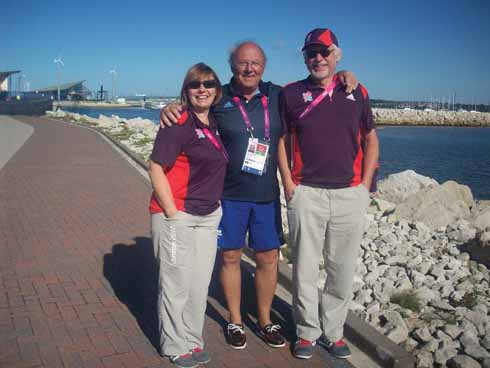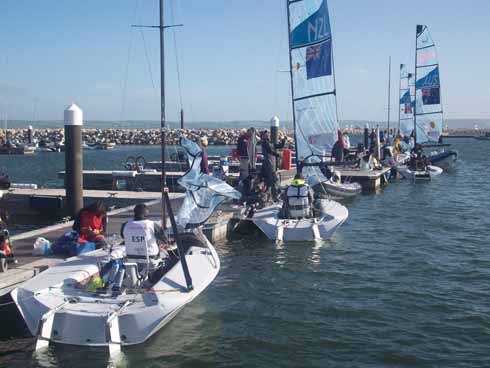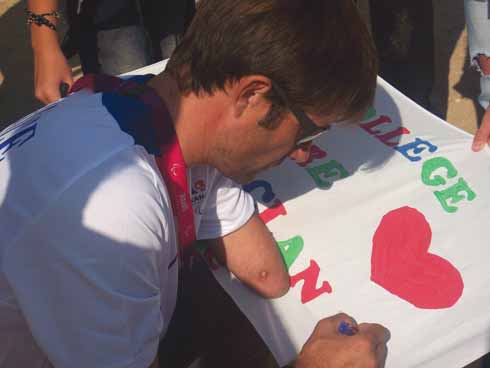Lingua franca
Paul Costello recalls his experiences as a Games maker at the Paralympic Games in Weymouth and Portland
Published in January ’13
‘The last skill you’ll need is speaking French,’ a colleague, Jetty Jones, had assured me, having worked with the French-speaking Monaco team in the Olympic sailing a few weeks earlier. ‘They all want to practise their English.’
Except, that is, Jean-Yves, the Chef de Mission of the French Paralympic sailing team, who it seems doesn’t have much of it to practise.
‘Vous parlez Français?’ Jean-Yves had asked, after a hearty handshake.
‘Un peu,’ I say with the wide-eyed smile we were taught to use at our training in Hackney. ‘Vous, Anglais?’ I respond.
‘U-u-r-r …’ he says with raised shoulders and a palm-down swivel of the right hand.
Jean-Yves cuts a grandfatherly figure and is utterly charming. And he is the man I shall be working for while the rest of the squad focuses on its real concern – sailing. I’d spent three months revisiting the subject for which I got a Grade ‘2’ at CSE half a century earlier. A Games Maker role with the French delegation in Weymouth and Portland was a privilege, but could I cope with their mother tongue?
In Living French – Complete with CD, which I’d borrowed from my local library, the lingo felt familiar despite the time lapse: ‘Monsieur Dupont prend le petit déjeuner à sept heures, et part pour la gare où il achète un journal et une pomme.’ If Jean-Yves wanted to report on a friend’s breakfast-time purchases from the station, I was in good order. I’d also learnt some other useful phrases: ‘Pierre était assis sur les rochers avec Madame Leblanc.’ Sitting on rocks – that might be useful, what with being by the sea.
‘Il a vu un homme dans un bateau de pêche.’ He saw a man in a fishing boat… oh yes, this would be a doddle!
Armed with Jetty’s assurance and, thanks to some pretty effective boning-up, knowing I could make a real contribution when it came to men buying apples and women meeting friends in the park for coffee and cake while they watched pretty, green ducks, I was ready for action.
Until, that is, Jean-Yves did the palm-down swivel, in a gesture I now knew meant: ‘comme ci comme ça’.
Enter my French colleague, Christine, who had lived in England for years and, like Jetty, had carried out the role of NPC (National Paralympics Committee) Assistant the month before, but in Christine’s case, with the French Olympic sailors.
To ensure Jean-Yves got the right support, we agreed that Christine would be his main contact. For the next two weeks she translated at meetings, made transport arrangements and dealt with unexpected visits from French schoolchildren, while I stood by, not contributing, to conversations about sail measurement, registration of radios and the likely impact of a deep cyclone tracking through the Channel.
On the second day, at coffee outside the team’s storage container, I decided more was required of me. I slipped a banana onto the makeshift table, silently rehearsing what I’d practised to perfection the previous evening: ‘J’ai acheté cette banane dans l’épicerie à côté de la gare à sept heures trente ce matin.’ In spite of moving the banana from side to side and repeatedly throwing significant glances at Jean-Yves and then the banana, he didn’t take the bait; my banana-buying habits remained secret.
Jean-Yves seemed every bit the family man so the next day I casually left my wallet open while he and Christine were (possibly) discussing the ballasting differentials of the 2.4 yacht being raced by Damien. The moment Jean-Yves noticed the photo of my daughter, I was ready to say: ‘C’est ma fille Lily. Elle a seize ans. Elle vit dans un joli village où ils ont un boulanger, un boucher et un petit lac. Elle prend son petit déjeuner à huit heures avant d’aller à l’école, et prend toujours une pomme à manger plus tard.’
Sadly, details of my sixteen-year-old daughter, her home village’s baker, butcher and lake, and her school-day breakfast and apple-eating activities went equally unsaid.
Despite freezing like rabbits in headlights when the other asked a question in his native language, Jean-Yves and I always managed a friendly smile, but our longest exchange was him pointing skywards and saying ‘vent’, which led to a mutual chuckle and nod of the head, but leaving me no wiser as to whether there was too much or too little wind.
After a few days I realised I was missing the point. And it was the Games Maker uniform that did it. From the first day I dressed up I’d felt proud to be one of seventy thousand volunteers chosen to represent Great Britain. The camaraderie and mutual respect between Games Makers reinforced this, as did drivers on the workforce shuttle buses who always offered a cheery: ‘Morning, how are you today?’
But I soon saw what the uniform also meant to those we were supporting. Each team had different needs: Singapore sought physical help preparing their boat, the Spanish wanted escorting to Weymouth to look around, the Danish liked domestic support at their house, while Jean-Yves looked for language and organising skills. But a common demand of athletes and officials across the twenty or so teams was simply for us to be there, in our conspicuous purple and scarlet, as a point of reference.
I soon forgot about contributing in the narrow way I’d expected to do, and helped however I could, displaying my uniform and wide-eyed smile with pride. I detected the joy in the loud ‘Good morning!’ as the Japanese man and his wheelchair tore past down the slope like a seventeen year old in an M-reg Peugeot; I felt the appreciation of an Argentinian, whose boat trailer I helped to push to the measuring sheds. In return I enjoyed the privilege of seeing dedicated athletes tend their boats, jumped at Jean-Yves’s invitation to follow races on a tracking screen in the athletes’ lounge, and basked in the joy of watching with the public from the ruins of Sandsfoot Castle.
The sailing finished, and with no medals for the French, but with an evident pride amongst them in having taken part, the nine-man team lined up for the coach that would unite them with their colleagues in London for the closing ceremony. As they boarded, there were air kisses and prolonged French farewells with Christine and a genuine handshake and ‘au revoir’ for me. Last in the queue was Jean-Yves. He took me quietly to one side and, with measured diction, said: ‘This morning I got up at seven o’clock and walked to the beach. On the way I went to the shop with the little yellow door and bought a small bag of red apples. This one is for you. I shall eat two on the coach, and the rest I shall feed to the pretty, green ducks in London when I go to the park for coffee and cake. Goodbye Paul.’
I was moved by his effort to speak in English, but the tragedy was, I’d have understood him if he’d said it in French.





